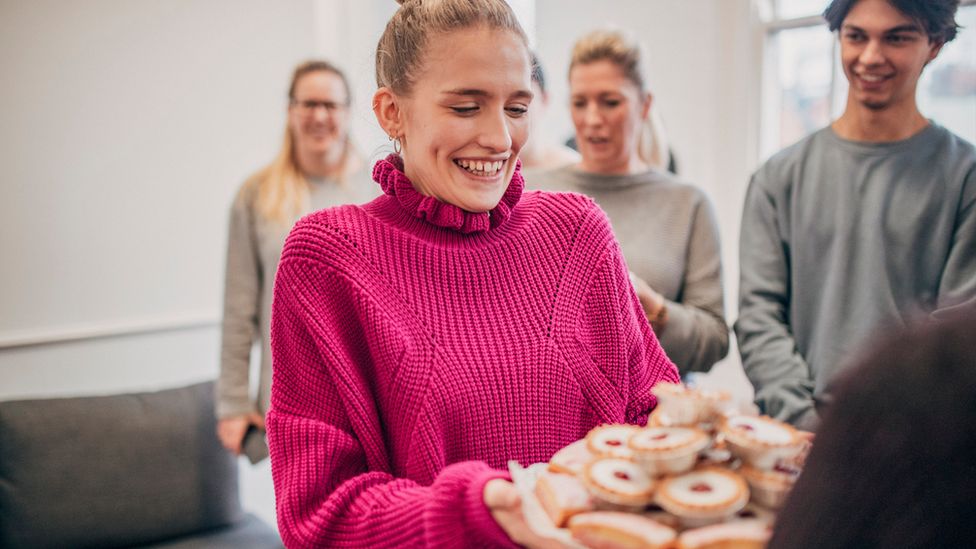ARTICLE AD BOX
 Image source, Getty Images
Image source, Getty Images
By Andre Rhoden-Paul
BBC News
If you work in an office, you know the drill. It's someone's birthday and the unwritten rules mean they or a generous boss supplies cake (or cakes) for all.
But is it time to kick the cupcakes, to get the gateaux away? A food regulator says workers should not bring in sweet treats - to avoid tempting colleagues.
Food Standards Agency chairwoman Prof Susan Jebb compared being around cake in the office to passive smoking.
She said: "If nobody brought cakes into the office, I would not eat cakes."
Interviewed by the Times newspaper, she says that workers should stop testing the willpower of colleagues.
But speaking to the BBC, GP Dr Helen Wall said people had to take responsibility for their own health.
The family doctor who practises in Bolton said: "If someone's got a cake next to you, you don't have to eat it, do you."
Prof Jebb, also a professor of diet and population at the University of Oxford, was speaking in a personal capacity when she argued eating cake is a choice but colleagues can help each other by providing "a supportive environment".
She said: "We all like to think we're rational, intelligent, educated people who make informed choices the whole time, and we undervalue the impact of the environment.
"If nobody brought cakes into the office, I would not eat cakes in the day. But because people do bring cakes in, I eat them. Now, OK, I have made a choice, but people were making a choice to go into a smoky pub.
"With smoking, after a very long time we have got to a place where we understand that individuals have to make some effort but that we can make their efforts more successful by having a supportive environment.
"But we still don't feel like that about food."
In many workplaces cake, biscuits and and sweets - brought by colleagues returning from holiday or to celebrate last days and birthdays - can start a scramble as hungry and sweet-toothed colleagues try to get their hands on the treats.
It is a rare workplace that breaks the tradition and supplies a fruit platter. And who wants to be known as the one staff members who brings in healthy nuts rather than chocolates as they regale colleagues about their weekend in Switzerland?
GP Dr Wall said it was fine to have some pleasures in the workplace.
Speaking on BBC Breakfast, she said: "It does feel like we're trying to control everything. At the end of the day you've got to have a little bit of willpower, haven't you...
"If somebody's smoking next to you, you can't help but inhale that.
"If someone's got a cake next to you, you don't have to eat it, do you?"
As to the government's official position, the prime minister's official spokesman said Rishi Sunak believes "personal choice should be baked into our approach".
He added: "We want to encourage healthy lifestyles and are taking action to tackle obesity, which has cost the NHS £6 billion annually.
"However, the way to deal with this issue is not to stop people from occasionally bringing in treats for their co-workers."
Mr Sunak's spokesman added that the prime minister was "very partial to a piece of cake" and most enjoys carrot and red velvet cake.
According to the NHS website, a majority of adults in England are overweight. Regularly consuming foods and drinks high in sugar increases your risk of obesity and tooth decay.
The FSA is responsible for food safety and food hygiene in England, Wales and Northern Ireland.
Prof Jebb who is on the Times Health Commission, a year-long inquiry by the paper into the future of health and social care in the UK, expressed frustration at ministers' decision to delay the introduction of a TV watershed for junk food advertising.
The Department of Health said the plans would be deferred for a year while officials assessed the impact on household finances as families struggle with the increasing cost of living.
Prof Jebb also said it was not enough to rely on "extraordinary efforts" of willpower to avoid overeating in a society plying people with food.
Share your experiences. Email haveyoursay@bbc.co.uk.
Please include a contact number if you are willing to speak to a BBC journalist. You can also get in touch in the following ways:
If you are reading this page and can't see the form you will need to visit the mobile version of the BBC website to submit your question or comment or you can email us at HaveYourSay@bbc.co.uk. Please include your name, age and location with any submission.

 2 years ago
51
2 years ago
51








 English (US) ·
English (US) ·